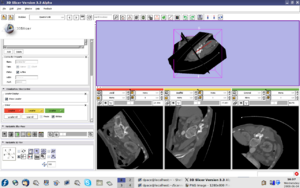Difference between revisions of "IGT:ToolKit/Navigation-with-Aurora"
From NAMIC Wiki
| Line 29: | Line 29: | ||
=== '''Step 2: Install IGSTK''' === | === '''Step 2: Install IGSTK''' === | ||
| − | IGSTK is used to acquire tracking data from the NDI Aurora tracking system. To build | + | IGSTK is used to acquire tracking data from the NDI Aurora tracking system. To build it from the source code, [http://wiki.na-mic.org/Wiki/index.php/IGT:ToolKit/Build-IGSTK find the instructions here]. |
==People== | ==People== | ||
Revision as of 00:20, 21 May 2009
Home < IGT:ToolKit < Navigation-with-AuroraBack to IGT:ToolKit
Contents
Overview:
This tutorial uses an NDI Aurora tracking system to explain how navigation works in Slicer3. It also contains a more advanced description of the OpenIGTLink protocol.
The general IGT navigation system consists of the following components:
- Slicer3 - the base platform plus IGT modules such as OpenIGTLink and NeuroNav
- IGSTK - an interfacing tool for common commercial tracking devices
- A tracking device - such as the NDI Aurora magnetic tracking system
Before you start the advanced tutorial, you should go through the Basic Navigation Tutorial.
Tutorial Materials
- Tutorial slides for the Advanced Navigation Tutorial
- Atlas: download the .zip file from either the SPL-PNL Brain Atlas or the SPL Abdominal Atlas
Required Hardware
- NDI Aurora tracking device with tracked tool
- If your computer does not have a serial port, you will need a Serial-to-USB converter
Software Installation Instructions
Step 1: Install Slicer3
Go to the Slicer3 Install site.
Step 2: Install IGSTK
IGSTK is used to acquire tracking data from the NDI Aurora tracking system. To build it from the source code, find the instructions here.
